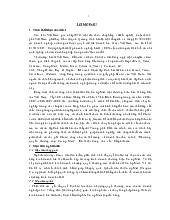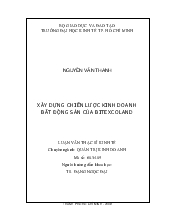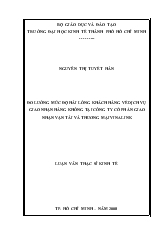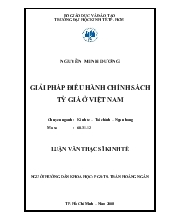Study on the biodegradability of polyetylene in the presence of transition metal stearates (Mn, Fe, Co)
- Người chia sẻ :
- Số trang : 27 trang
- Lượt xem : 17
- Lượt tải : 500
- Tất cả luận văn được sưu tầm từ nhiều nguồn, chúng tôi không chịu trách nhiệm bản quyền nếu bạn sử dụng vào mục đích thương mại
Bạn đang xem trước 20 trang tài liệu Study on the biodegradability of polyetylene in the presence of transition metal stearates (Mn, Fe, Co), để xem tài liệu hoàn chỉnh bạn click vào nút DOWNLOAD LUẬN VĂN ở trên
Plastics play an important role in the modern world. They have been found to be extremely versatile materials with many useful uses for human life since the 1950s. In 2015, 322 million tonnes of plastics were produced throughout the world. Average plastic consumption per capita in 2015 is 69.7 kg/person in the world, 48.5 kg/person in Asia, 155 kg/person in USA, 146 kg/person in Europe, 128 kg/person in Japan, 41 kg/person in Vietnam (a significant increase by 33 kg/person compared to 2010). Polyethylene is the most widely used thermoplastic in the world, consumed more than 76 million tons per year, accounting for 38% of total plastic consumption. Increased demand for plastics causes increase in waste and global environment pollution. In 2012, the amount of plastic waste dumped into the environment was 25.2 million tons in Europe, 29 million tons in the United States. According to environmental reports of the United Nations, around 22- 43% of the world’s waste is buried in the landfill and 35% of waste in ocean. In Vietnam, the average annual volume of solid waste has increased by nearly 200% and will increase in the near future, estimated at 44 million tons per annum. According to the Marine Conservation Organization and the McKinsey Center for Business and Environment, plastic waste of Vietnam is the world’s fourth largest by volume (0.73 million tons/year, representing 6% of the total in the world) in 2015. To solve this problem, in the past few decades, scientists have focused on the development of plastic materials which decompose easily. Adding pro-oxidant additives is the most interesting method. Prooxidant additves are usually transition metal ions introduced in the form of stearates or complexes with other organic compounds. Transition metals are used as prooxidant additves, including Ti, V, Cr, Mn, Fe, Co, Ni, Cu, Zn, Ca ., the most effective of which are the stearate of Co, Mn and Fe. Under the influence of ultraviolet (UV) radiation, temperature or mechanical impacts, prooxidant additives promote the oxidation of polymer chains to form functional groups such as carbonyl, carboxyl, hydroxide, ester, etc. which can be consumed by microorganisms. In the presence of prooxidant additives, the degradation time of plastics from hundreds of years decreased to several years or even several months. For the above reasons, we propose the dissertation: “Study on the biodegradability of polyetylene in the presence of transition metal stearates (Mn, Fe, Co)”.




